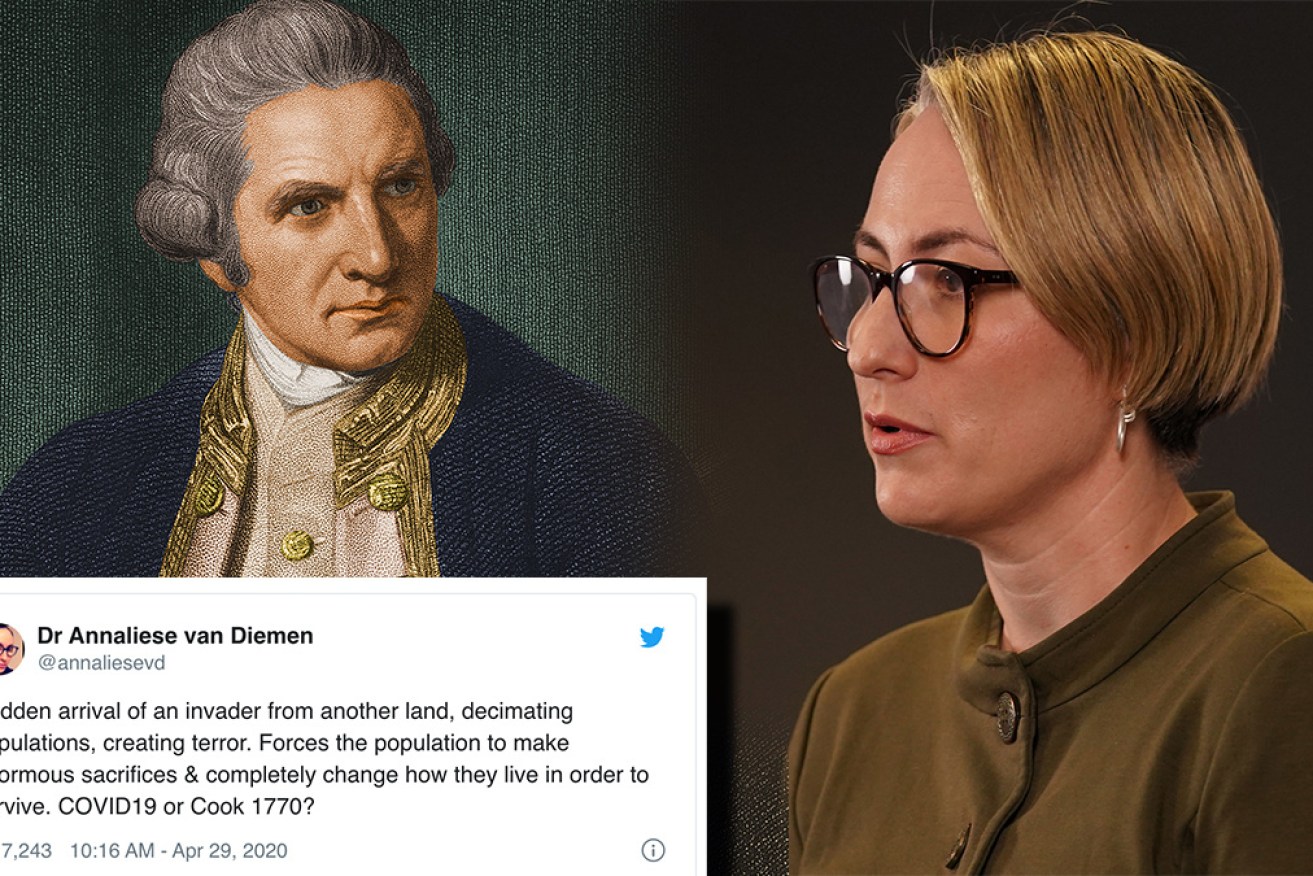Coronavirus culture war: Captain Cook, that tweet, the right, and their blather


Right wing 'culture warriors' have piled on Victoria's deputy chief health officer. Photo: AAP/Getty
They say there are no atheists in foxholes. Until recently, it looked as though there were no culture warriors in pandemics, either.
With the nation’s entire political bandwidth taken up with COVID-19, those wanting to start something on the cultural right were reduced to confecting outrage over bats and golf.
In that sense, Dr Annaliese van Diemen’s tweet this week was a gift to folks locked up at home and just itching to get back to some good ol’-fashioned culture-warrin’.
Dr van Diemen, Victoria’s deputy chief health officer for communicable disease, marked the 250th anniversary of Captain James Cook’s landfall at Botany Bay by comparing the effects of Cook’s arrival to those of a pandemic:
Sudden arrival of an invader from another land, decimating populations, creating terror. Forces the population to make enormous sacrifices & completely change how they live in order to survive. COVID19 or Cook 1770?
— Dr Annaliese van Diemen (@annaliesevd) April 29, 2020
The Victorian opposition leapt on the comments, with federal counterparts including Peter Dutton and Eric Abetz joining the fray.
So what exactly did Dr van Diemen do wrong?
The first complaint seems to be that, given the current emergency, van Diemen should only be tweeting about COVID-19. (Which technically she was, but not, one assumes, in the right way.)
There’s recent precedent here: the Victorian chief health officer, Brett Sutton, was also attacked for tweeting one of those ‘me at 20’ photos.

Victoria’s chief health officer drew criticism for posting a #MeAt20 photo. Image:Twitter
This complaint is a self-serving fig-leaf. Plenty of other senior officials send tweets on their days off, and even during their workdays, without anyone thinking this is some grievous sin. So, for that matter, do plenty of politicians.
The second charge being bandied about is that the tweet is ‘divisive.’ But divisive in what way, exactly? The tweet doesn’t seem to create any new divisions, given battlelines about colonisation are well-drawn at this point.

Dr van Diemen’s tweet was criticised as “divisive”. Image: Twitter
As so often happens, ‘divisive’ here doesn’t mean creating divisions but drawing attention to divisions that actually exist. It’s a plea to go back to a time when nobody forced you to think about the reality of Australian history.
Tim Smith, Victorian opposition MP, golf aficionado and spurner of bats, tried to open up a third line of attack here: that the tweet misses its mark, because Cook arrived nearly two decades before the First Fleet and didn’t stick around to take anyone’s land.

Victorian MP Tim Smith argued that the tweet missed the mark. Image: Twitter
Cook’s voyage was indeed a major feat of navigation (remarkably, Cook didn’t lose a single man to scurvy) and an important scientific venture. Even so, it’s hard to see why the Australian government would earmark $48.7 million to celebrate science done 250 years ago by personnel from another nation.
Notoriously, $6.7 million of that was to go towards a replica of HMS Endeavour that would have circumnavigated the continent – something neither Cook nor his ship ever did. That particular commemoration only makes sense if Cook’s voyage is meant to have significance for the continent as a whole, not just the bits Cook saw.
That, right there, is the dilemma for those attacking Dr van Diemen. Either you think Cook’s voyage is an interesting part of British maritime history, in which case Australia seems to be making an inexplicable degree of fuss about it.
Or, you think Cook’s voyage is especially important here because of its role in the British colonisation of the Australian continent. There’s no third, “Cook is really important for this country specifically, but he has nothing to do with its dispossession” option available.
You can’t, in fact, disentangle Cook’s significance for Australia from the colonial project that stole this land and killed vast numbers of its inhabitants.
It was, after all, Cook who claimed the eastern half of the continent for Britain, skipping over the ‘with the Consent of the Natives’ clause in the secret orders he carried.
There’s nothing ‘divisive’ about honestly noting all this – unless, that is, you still think ‘colonialism was good’ is somehow a morally serious view that we have to respect.
Like most culture war skirmishes, this one is really a scorched-earth retreat by forces that know they’ve already lost. On the bright side, though, at least we’ve stopped talking about golf.
Patrick Stokes is associate professor of philosophy at Deakin University and a Melbourne-based writer and broadcaster








